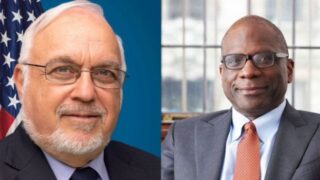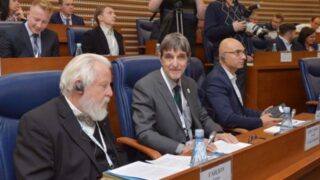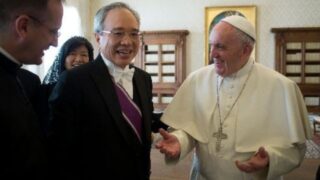One question is never asked. How can forbidding politicians from attending events of one particular religion be compatible with religious liberty?
by Massimo Introvigne
Article 3 of 7. Read article 1 and article 2.


On August 11–15, 2022, the Universal Peace Federation (UPF), an organization formally independent from the Unification Church/Family Federation but created by its same founders, the late Reverend Moon and his wife, held in Seoul, South Korea, its Summit 2022 and Leadership Conference. Among those who were present and lectured—many others attended through videos—were prominent American politicians such as Mike Pompeo and Newt Gingrich. It was not a purely conservative gathering, as dozens of cabinet ministers and others attended from all over the world, and from all sorts of political persuasions.
All mentioned their gratitude not only to the UPF but specifically to Reverend and Mrs. Moon for their work on behalf of world peace. They probably knew that in Japan media and some politicians were proposing purges and laws against politicians who attend UPF meetings, but they did not care.


The assassinated former Prime Minister Shinzo Abe had sent a video to a UPF event in 2021 and a message to another one in 2022. His assassin claimed that his mother went bankrupt in 2002 because of her excessive donations to the Unification Church, and he wanted to punish Abe as a fellow traveler of the Church.
In Japan, the Unification Church has old, powerful, and well-organized enemies. They quickly called press conferences and recruited friendly reporters for a campaign aimed at blaming the victims, i.e. Abe and the Unification Church, rather than the perpetrator. They also published lists to name and shame Japanese politicians who had attended events of the UPF and other organizations connected with the Unification Church. They called for them to publicly disassociate themselves from these organizations, and even asked cabinet ministers to resign.
Urban legends were also spread in Japan and reported by international media without fact-checking. One was that Abe’s grandfather, Prime Minister Nobusuke Kishi, invited the Unification Church to expand from Korea to Japan, hoping it could offer support to his conservative agenda. This claim is false. Korean missionaries brought the Unification Church to Japan in 1959, long before a Japanese member met Kishi in the mid-1960s.
It is also false that, as some media claimed, the ruling Liberal Democratic Party (LDP) “largely relies” on the votes and campaign volunteers of the Unification Church to win the elections. The LDP has some 20 million voters and more than one million active members. Unification Church devotees may only account for a small percentage of these. Finally, it is false that only LDP politicians attend events of Unification-Church-related organizations. The same hostile media listed MPs of other parties who also participated.


What is true is that Abe and his grandfather Kishi expressed sympathy not so much for the Unification Church as a religion but for a church-related organization called International Federation for Victory Over Communism (IFVOC), which had emerged as the leading anti-communist organization in Japan. It is not surprising that it called to support anti-communist politicians, and in turn politicians concerned with the Communist threat supported the IFVOC.
And why shouldn’t they? Seen from any other democratic country, the Japanese controversy appears both surrealistic and dangerous. In Japan, the Komeito party, the junior partner of the LDP in the current government coalition, has been founded by members of the largest local Buddhist movement, Soka Gakkai. Although formally separated from Soka Gakkai since 1970, it maintains close relationships with the Buddhist movement. Other religious groups, including liberal left-wing Catholics, have emerged as vocal critics of the LDP and support its opponents. Indeed, there is a century-old tradition in Japan of “non-separation between religion and politics,” although it always had its critics too.
In a democratic society, all citizens have a right to participate in the political debate, support politicians of their choice, and campaign for one or another party. It would be deeply undemocratic to deny to religious believers a right recognized to all other citizens.
As a Catholic, I am inspired by famous pages by Popes John Paul II and Benedict XVI distinguishing between “secularity” as a healthy separation between church and state and “secularism,” but leaders of other religions have emphasized the same distinction as well. While secularity is a needed protection against any confusion between religious and political authorities of the type prevailing in Iran, secularism is an ideology that would forbid religious believers inspired by their faith to freely participate in politics, with the same rights and duties of all other citizens.
Excluding those who believe in God from political activism or office in the name of secularism makes them into second class citizens, deprived of their fundamental right of participating in the life and institutions of their country. Not less anti-democratic is excluding members of certain unpopular religions from politics. International institutions rightly censor Pakistan for preventing members of a religious minority called Ahmadiyya from voting and holding office.


Investigating and denouncing politicians who attend events of the Unification Church and its related organizations carries with it a simple message. In Japan both the freedom of citizens who happen to be believers to fully participate as believers in the democratic process, and the freedom of politicians to consult and cooperate with leaders and members of religions of their choice, are at risk.
In fact, some radical voices in the Japanese media ask precisely that politicians should be prevented from cooperating in any way not only with the Unification Church but with any religion. This is not healthy separation of church and state. It is ideological, anti-democratic, discriminatory secularism. Defending the rights of politicians to attend events of the Unification Church, or any other religion, and to have religionists among their supporters and volunteers without risking their seats and careers, means defending at the same time the religious liberty of all religions—and of all Japanese citizens.









